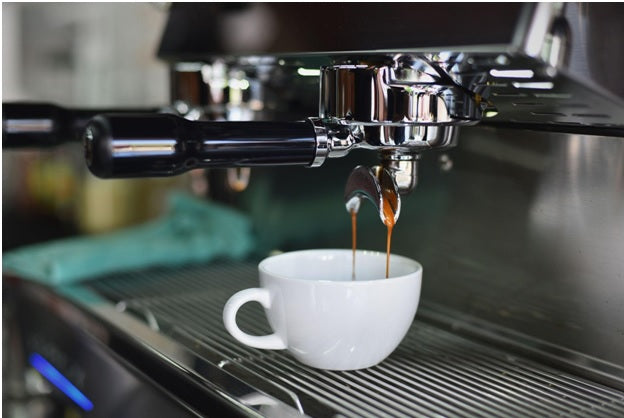2 Signs You Need An Espresso Machine Water Filter

Being a barista is probably one of the most fun jobs out there. It is a trade that's easy to learn and you get to see action right off the bat, which can be exciting or intimidating, depending on your personality. As you master the trade and officially become a coffee expert, you get to learn about the different grains, and how each aspect of the brewing process affects the scent, flavor, and texture of your coffee. This means that equipping your venue with the right espresso machine and getting the best supplies is almost as important as your training.
However, water quality can make a world of difference and you must pay attention to it to prevent two of the most common problems baristas and coffee shops face. Fortunately, these issues can be easily solved with an espresso machine water filter.
Bad Tasting Coffee
One of the most frustrating aspects of this job is when you or your business seems unable to offer a uniform brew. You know how to make the perfect latte and you know your espresso machine inside out. However, there are times when the flavor is off by a mile, and every cup you pour that day is a disappointment. Even if you have internalized the brewing process to a point where every movement is uncannily mechanical, the coffee is just not right, but you know it has nothing to do with your barista skills.
One of the main causes of this is the quality of the water you pour into your mix. Contrary to what most think, no two drops of water are the same. There are, in fact, many types of water: we have spring water, filtered, distilled, and the ever-present tap water.
Tap water also comes in two varieties, hard water, and soft water. Depending on the intended use, neither is better than the other.
Hard water is liquid that comes from the source directly to your tap. It is usually a long trajectory, and water tends to pick up mineral particles with it. These include calcium and magnesium which naturally occur in rocks and riverbeds. If the water contains too much of these hardness minerals, then it becomes hard water. To be clear, hard water is not harmful as we absorb vital minerals from it. However, hard water has a strong flavor that can directly impact the taste of your coffee.
There are ways to remove these minerals from the water. Boiling and distilling are the two most common ways to go about it, but there is a problem with this approach. When you completely strip water away from all its minerals, you end up with a bland and flat brew that does not carry any of the triumphant notes of your favorite blend and might deprive you of any aftertaste.
Spring water is sometimes touted as an option. However, spring water too can carry a lot of minerals with it. Moreover, it is quite expensive which can drastically reduce profit margins for your business without bringing any evident benefits.
Your best bet is to install one of our Everpure espresso machine water filters. They give you a wide range of micron ratings so you can control the hardness of your water, and still offer great-tasting coffee every time.
Our espresso machine water filters remove excess chlorine and other taste-affecting chemicals, taking the randomness out of your coffee equation.
Your Espresso Machine Keeps Breaking Down
Our espresso machine is one of the main tools of any coffee shop. We go through great pains when cleaning at the end of every shift so it continues to dish out perfect brews without breaking down. However, breakdowns happen and the downtime can cost you a lot of business if they happen too often.
The problem is that hard water slowly creates limescale inside your components when heated. The internal pipes and lines are progressively narrowed by limescale, slowing down the heating process, which in turn affects the way your coffee is brewed. Buildup can clog water passages, make your machine give you inaccurate temperature and level readings, and even cause your seals and valves to fail.
This again sounds like a recommendation to completely distill your water to prevent your machine from breaking down. However, these minerals are necessary to give your water the ability to extract the solids and oils of your coffee grains and carry them into your final brew. Experts from the Specialty Coffee Association of America (SCAA) recommend hardness levels between 35 ppm and 85 ppm.
Many modern espresso machines allow you to factor in water hardness so you can create a descaling schedule for a thorough cleanup to keep optimal mineral levels. However, water hardness changes with each season, and it can increase the frequency of your descaling sessions.
Your best bet is to install an espresso machine water filter that lets you control the desired level of hardness, keep harmful dirt and mineral particles out, and still make sure you make someone's day every day. Moreover, espresso machine water filters drastically extend the longevity of your brewing equipment, helping you save money in the long run.
Everpure Has The Best Espresso Machine Water Filters
We offer many options that are at home in small cafés, exclusive restaurants, and fast food chains.
Our Everpure QL2-OCS is perfect for small applications that require a modest but reliable flow rate to keep the coffee flowing. If you need more capacity, you should try the Everpure QC7i-MH(2) espresso machine water filter system. It is ideal for commercial coffee machines providing a constant flow rate of 1.67 gallons per minute, and a storage capacity of 9,000 gallons of fresh water.
If your business depends on delivering great-tasting and high-quality coffee, you need to install one of our Everpure espresso machine water filters. Browse through our product catalog, or contact us to find the best option for your business today.
